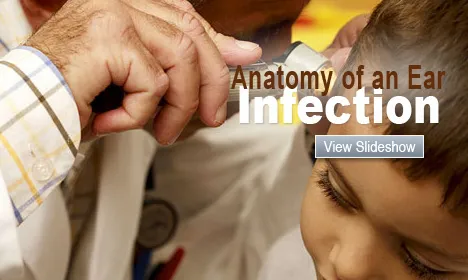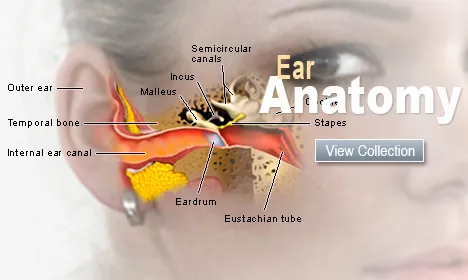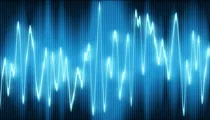Trending Hearing Topics
Tinnitus
Tinnitus is a ringing or swishing that seems to originate in the ear or head. Causes of tinnitus include loud noise exposure, medications, and other diseases. Treatment options are limited for tinnitus. Tinnitus can be prevented by wearing hearing protection when exposed to loud noises.
Understanding Ear Infections Slideshow
Watch this slideshow tour through the ear, helping you understand the causes of ear infections and how they are diagnosed and treated. See how ear tubes work to ease chronic ear infections and protect against hearing loss.
Image Collection: Illustration of Ear Anatomy
View an illustration of ear anatomy and learn about the outer, middle and internal sections that make up the ear and their functions.
Read more about Image Collection: Illustration of Ear Anatomy»
Eustachian Tubes
Learn Eustachian tube problems like clearing the ears when flying, or suffering infection and incurring an ear infection.
Tinnitus
Watch this slideshow on Tinnitus (ringing in the ears) and learn causes, symptoms, relief remedies, treatments and prevention tips.
Swimmer's Ear
Read about swimmer's ear (external otitis or otitis externa), an infection of the skin covering the outer ear. Find prevention tips, symptoms, causes and treatment (ear drops) for chronic, acute infections.
Related Disease Conditions
 Can I Teach Myself Sign Language?
Can I Teach Myself Sign Language?Because sign language is complex, it is very difficult to teach it to yourself. Check out the center below for more medical references on language, including multimedia (slideshows, images, and quizzes), related disease conditions, treatment and diagnosis, medications, and prevention or wellness.
 Cauliflower Ear
Cauliflower EarCauliflower ear, or "boxer's ear," is caused by an injury to the ear, usually by blunt trauma from sports such as boxing, wrestling, or martial arts. When hematomas form, infection and eardrum injury may occur in addition to hearing loss if not treated. Treatment goals are to drain blood from hematomas, treat infection, and at times administer antibiotics to prevent further infection.
 Deafness
DeafnessHearing loss (deafness) may be present at birth or it may manifest later in life. Deafness may be genetic or due to damage from noise. Treatment of deafness depends upon its cause. Sensorineural hearing loss can be caused by conditions affecting the cochlea, eighth cranial nerve, spinal cord, or brain. Examples of conditions that can lead to sensorineural hearing loss include Meniere's disease, noise-induced hearing loss, hearing loss of aging (presbycusis), nerve injury from syphilis, hearing loss of unknown cause (idiopathic hearing loss), nerve tumors, and drug toxicity (such as aspirin and aminoglycosides).
 Deviated Septum
Deviated SeptumA deviate septum is a condition that may require surgery. With a deviated septum, the bone and cartilage that divide the nasal cavity of the nose in half (nasal septum) is significantly off-center or crooked. The causes of a deviated septum can be congenital, or develop after a trauma or injury to the nose. Symptoms of a deviated septum include nasal congestion, recurrent sinus infections, nosebleeds, headache, facial pain, postnasal drip, snoring, and loud breathing. A deviated septum can be relieved with medications and, if necessary, a surgery called septoplasty.
 Does Tinnitus Ever Go Away?
Does Tinnitus Ever Go Away?Tinnitus is when you hear ringing or other noises — like roaring or humming — in one or both ears. Many times tinnitus lasts for a few seconds to minutes, but other times it may be permanent.
 Ear Care and Ear Health Tips
Ear Care and Ear Health TipsThe most important measure to keep ears healthy is to avoid loud noise. It is also important to keep the auricle and the ear canal clean.
 Ear Wax
Ear WaxEarwax (ear wax) is a natural substance secreted by special glands in the skin on the outer part of the ear canal. It repels water and traps dust and sand particles. Usually, a small amount of wax accumulates, dries up, and then falls out of the ear canal carrying with it unwanted particles. Under ideal circumstances, you should never have to clean your ear canals. The absence of ear wax may result in dry, itchy ears, and even infection. Ear wax may accumulate in the ear for a variety of reasons including; narrowing of the ear canal, production of less ear wax due to aging, or an overproduction of ear wax in response to trauma or blockage within the ear canal.
 Eustachian Tube Problems
Eustachian Tube ProblemsThe Eustachian tube is a membrane-lined tube that connects the middle ear space to the back of the nose. Symptoms of Eustachian tube dysfunction or blockage include popping and/or clicking in the ear, and ear fullness and/or pain. Causes of Eustachian tube dysfunction or blockage include allergies, sinus infections, ear infections, and the common cold. Treatment includes home remedies to relieve pain and several maneuvers (swallowing, chewing gum, yawning, etc.), which can be done to improve Eustachian tube function. In severe cases, surgery may be necessary.
 How Can I Dry Up Fluid in My Inner Ear?
How Can I Dry Up Fluid in My Inner Ear?There are many ways for water to get into your ear. These five home remedies can help dry or drain the fluid from your ears.
 How Can I Stop Tinnitus Immediately?
How Can I Stop Tinnitus Immediately?Tinnitus — sometimes called ringing in the ears — is when you perceive sound even though there's no actual external source making that sound. You can stop tinnitus by treating the underlying cause, but there is no quick guaranteed method of curing tinnitus.
 How Can I Unclog My Ears at Home?
How Can I Unclog My Ears at Home?Clogged or stuffy ears may cause considerable discomfort that includes ear fullness, dizziness, muffled hearing, ringing in the ears and ear pain. Home remedies to unclog your ears include chewing, ear irrigation, performing the Valsalva maneuver, applying warm compresses, using OTC nasal decongestants or or putting oil drops or hydrogen peroxide into the affected ear.
 How Can You Unblock Your Ear?
How Can You Unblock Your Ear?There are times when your ears get clogged for various reasons. This can cause pain and discomfort and may affect your hearing. Chewing gum, eating hard candy, yawning, gargling and other strategies may help you unclog your ears.
 How Do Deaf People Learn to Speak?
How Do Deaf People Learn to Speak?Deafness is profound hearing loss, wherein people may only be able to hear very little or nothing at all. Some people may be born deaf (congenital deafness). In some, it may occur during early childhood due to genetic factors, trauma, infections, etc.
 How Do You Clear Blocked Eustachian Tubes?
How Do You Clear Blocked Eustachian Tubes?Learn what medical treatments can help ease your blocked eustachian tube symptoms and speed up your recovery for blocked eustachian tubes. Ear infections are common and usually go away on their own after a few days, even without medical treatment. Learn about causes and treatment.
 How Do You Get Rid of Ringing in the Ears (Tinnitus)?
How Do You Get Rid of Ringing in the Ears (Tinnitus)?Tinnitus is not a condition in itself, but a symptom of some other condition that causes a high-pitched whine, a ringing, buzzing or clicking in the ears. It can come from any number of problems starting with the eardrum and cochlea – the organs that turn sound waves into electrical signals for the brain to interpret as sound.
 How Do You Know if Ear Pain Is Serious?
How Do You Know if Ear Pain Is Serious?How do you know if ear pain is serious? Learn the signs of ear problems and when to see a doctor.
 How Serious Is Pulsatile Tinnitus?
How Serious Is Pulsatile Tinnitus?Pulsatile tinnitus is a sign of certain medical conditions, and its severity depends on the condition causing it. If the cause is treatable, pulsatile tinnitus is likely to get cured. Rarely is it caused by more serious problems.
 Inner Ear Infection
Inner Ear InfectionAn inner ear infection or otitis interna is caused by viruses or bacteria and can occur in both adults and children. An inner ear infection can cause symptoms and signs, for example, a severe ear, dizziness, vertigo, nausea and vomiting, and vertigo. An inner ear infection also may cause inflammation of the inner ear or labyrinthitis. Inner ear infections are not contagious; however, the bacteria and viruses that cause the infection can be transmitted to other people. Good hygiene practices will help decrease the chances of the infection spreading to others. Inner ear infection symptoms and signs like ear pain and nausea may be relieved with home remedies or over-the-counter (OTC) medication. Some inner ear infections will need to be treated and cured with antibiotics or prescription or antinausea medication.
 Is A Tympanoplasty Painful?
Is A Tympanoplasty Painful?Tympanoplasty is a surgery involving the repair (reconstruction) of the eardrum (tympanic membrane). This is usually performed for a hole (perforation) in the eardrum.
 Labyrinthitis
LabyrinthitisLabyrinthitis occurs when there is inflammation of the part of the ear responsible for balance and hearing), usually due to viral infections of the inner ear. Learn about causes, symptoms, and treatment.
 Mastoiditis
MastoiditisMastoiditis in children and adults is inflammation and/or infection of the mastoid bone, which is located behind the ear. The most common cause of mastoiditis is an inner ear infection or otitis media. Acute mastoiditis lasts for a short period, while chronic mastoiditis can last for months to years. Symptoms of acute mastoiditis in children and adults include pain and swelling behind the ear, pus draining from the ear, and a low-grade fever. Complications of mastoiditis include meningitis, abscess, dizziness, and conductive hearing loss. Mastoiditis requires antibiotic treatment so it cannot be treated at home with natural products or home remedies; however, home remedies may help reduce symptoms of pain, inflammation, and fever. Some individuals will need surgery to cure their infection.
 Meniere's Disease
Meniere's DiseaseMeniere disease (idiopathic endolymphatic hydrops) is an inner ear disorder with symptoms that include vertigo, tinnitus, hearing loss, and the sensation of ear fullness. The primary treatments for Meniere's disease are diuretics, anti-vertigo, anti-nausea, and low-salt diets. Surgery may be recommended if the vertigo cannot be controlled with medication.
 Middle Ear Infection
Middle Ear InfectionA middle ear infection (otitis media) can cause earache, temporary hearing loss, and pus drainage from the ear. It is most common in babies, toddlers, and young children. Learn about causes and treatment.
 Noise-Induced Hearing Loss
Noise-Induced Hearing LossNoise-induced hearing loss may be an acoustic trauma, which causes temporary hearing loss, or it may be permanent due to an acute acoustic trauma. Experts agree that continual exposure to more than 85 dBs (decibels) is dangerous to the ears. Ear plugs and ear muffs can help prevent noise-induced hearing loss as well as decreasing exposure to loud noises.
 Objects Or Insects In Ear
Objects Or Insects In EarObjects or insects in the ear can be placed in the ear by patients themselves or an insect crawling in the ear. Earwax can also cause ear problems if Q-tips are overused to clean the ears. Symptoms and signs of an object in the ear are inflammation and sensitivity, redness, or discharge of pus or blood. When to seek medical care for an object or insect in the ear is included in the article information.
 Ruptured Eardrum
Ruptured EardrumA perforated (ruptured, punctured) eardrum (tympanic membrane) is a hole or tear in the eardrum. The eardrum separates the ear canal and middle ear. Most ruptured eardrums do not cause pain, however, the condition can be uncomfortable. Bacteria, viral, and fungal infections are the most common cause of a ruptured eardrum. Earwax removal attempts, changes in air pressure, and trauma are other causes of a ruptured eardrum. If you have a ruptured eardrum you may have symptoms like ear pain, partial or full hearing loss, a mucousy or pus-like blood-tinged discharge from your ear, bleeding from the ear, ringing in the ear, vertigo, nausea, vomiting, and middle ear infection. Most people do not need medical treatment for a ruptured eardrum, however, some may need surgery depending on the cause and size of the hole in the eardrum.
 Swimmer's Ear (External Otitis)
Swimmer's Ear (External Otitis)Swimmer's ear (external otitis) is an infection of the skin that covers the outer ear canal. Causes of swimmer's ear include excessive water exposure that leads to trapped bacteria in the ear canal. Symptoms of simmer's ear include a feeling of fullness in the ear, itching, and ear pain. Chronic swimmer's ear may be caused by eczema, seborrhea, fungus, chronic irritation, and other conditions. Common treatment includes antibiotic ear drops.
 Tinnitus
TinnitusTinnitus is described as a throbbing, ringing, clicking, or buzzing in one or both ears. Tinnitus is caused by trauma to the ear, overexposure to loud noises, medication, and diseases or infections of the ear such as multiple sclerosis, TMJ, autistic neuroma, Meniere's disease, hearing loss, and aging. Treatments include medication, tinnitus masking, retraining therapy, and relief therapy.
 What Are the 5 Warning Signs of Bladder Cancer?
What Are the 5 Warning Signs of Bladder Cancer?The term cancer means an uncontrolled growth of cells in the body. When cancer begins in the urinary bladder, it is called bladder cancer. The urinary bladder, often simply called the bladder, is a balloon-like organ present in the lower abdomen near the pelvis.
 What Happens After Endolymphatic Sac Decompression Surgery?
What Happens After Endolymphatic Sac Decompression Surgery?Endolymphatic sac decompression surgery is done to drain excess fluid from the inner ear. After this surgery, the operated ear is covered with a Glasscock dressing, which is a special dressing applied to keep the pressure on the site to reduce swelling. There is usually some tenderness and discomfort in the operated ear and throat (from the breathing tube inserted during surgery), which may be controlled by painkillers.
 What Is A Vestibular Neurectomy?
What Is A Vestibular Neurectomy?Vestibular neurectomy is one of the surgical treatments for Meniere's disease (dizzy spells with hearing loss).
 What Is Middle Ear Surgery?
What Is Middle Ear Surgery?Middle ear surgery is a part of the series of surgical procedures to manage middle ear diseases. There are four different surgeries carried out to treat middle ear disorders.
 What Is Noise? Or What Is Noise Pollution?
What Is Noise? Or What Is Noise Pollution?Noise is an unwanted sound that is unpleasant, loud, or disruptive. Other words for noise include buzz, cacophony, commotion, crash, cry, explosion, roar, or turbulence.
 What Is the CPT Code for Foreign Body Removal From the Ear?
What Is the CPT Code for Foreign Body Removal From the Ear?The current procedural terminology (CPT) code for foreign body removal from the ear without general anesthesia is 69200. The type of removal described in this procedure includes the removal of foreign bodies under direct visualization with an otoscope (an instrument for examining the ear).
 What Is the Most Effective Treatment For Tinnitus?
What Is the Most Effective Treatment For Tinnitus?Tinnitus is the perception of abnormal sounds in the ears. Tinnitus may sound like ringing, bussing, roaring, clicking, hissing, or humming in one or both ears. Tinnitus is not a disease itself. Tinnitus is usually a manifestation of an underlying condition, such as age-related hearing loss, ear injury, or circulatory system disorder. However, in many cases, there is no identifiable cause.
 What to Do If You Wake Up With a Blocked Ear?
What to Do If You Wake Up With a Blocked Ear?Here are 12 home remedies and tips for relieving a blocked ear, which include taking a few sips of water and the Valsalva maneuver.
 What Vitamin Deficiency Causes Ringing in the Ears?
What Vitamin Deficiency Causes Ringing in the Ears?Ringing in the ears has been linked to vitamin B12 and vitamin D deficiencies. Treating an underlying cause of tinnitus such as a vitamin deficiency may help relieve symptoms.
 Who Is Most Affected by Tinnitus?
Who Is Most Affected by Tinnitus?Learn what medical treatments can help ease your tinnitus symptoms and help you manage this condition. What is tinnitus and what are the main causes of tinnitus? Learn more about this tinnitus and what you can do about tinnitus.
Multimedia: Slideshows, Images & Quizzes
 Cardio Exercise: Good for More Than Your Heart
Cardio Exercise: Good for More Than Your HeartYou might have guessed that cardio, or aerobic, exercise helps to strengthen your heart. But did you know it's good for your health in lots of other ways, too? Learn about the hidden benefits.
 Ear Infection Quiz: Test Your Medical IQ
Ear Infection Quiz: Test Your Medical IQIs it possible to prevent ear infections? Take the Ear Infection (Otitis Media) Quiz to learn the risks, causes, symptoms and treatments for the common ear infection.
 Hearing Loss: Causes of Temporary, Permanent, or Sudden Hearing Loss
Hearing Loss: Causes of Temporary, Permanent, or Sudden Hearing LossProblems with your ears like ear infections can cause signs of hearing loss. This may be sensorineural hearing loss or conductive hearing loss. Learn how loud noises can induce hearing loss, the signs of hearing loss, and different ways you can prevent hearing problems.
 Picture of Ear
Picture of EarThere are three sections of the ear, according to the anatomy textbooks. They are the outer ear, the middle ear, and the inner ear. See a picture of Ear Anatomy and learn more about the health topic.
 Tinnitus: Why Are My Ears Ringing?
Tinnitus: Why Are My Ears Ringing?What is tinnitus? Explore tinnitus (ringing in the ears) causes, symptoms, relief remedies, treatments and prevention tips. Learn about pulsatile tinnitus.





